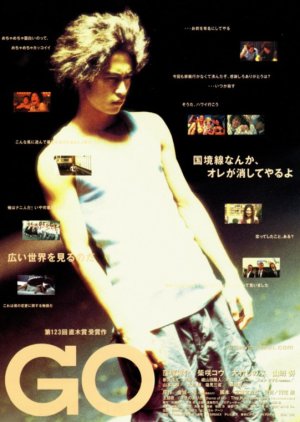
The movie opens up with this declaration, uttered in background narration by the main character while he's scorned and targeted by a players-filled basketball court. And it isn't only the rival team watching him with contempt: his own teammates are shouting the loudest.
"This is my love story", repeats Sugihara while he escapes from the police or is beaten by his father.
The contrast between the narration and the scene shown on screen gives us the key to the reading of the whole film, which is about finding ones place between love and hate, belonging and distancing, caring and detachment.
It's the story of a young man who has to show the world he doesn't give a dime while inside he's yearning for a sense of belonging.
GO is a wonderfully dramatic movie, one that deals with a cruel reality of discrimination. It's the journey of a guy who struggles to find his place on the planet. But don't be fooled by the surface: the director highlights the Japanese prejudices and the Korean stubborn obtuseness in equal measure. To each their own share.
And in the middle of this, there's Sugihara, who looks like a Japanese, talks like a Japanese, was born in Japan and is not recognized as one. His part is superbly acted: Yosuke Kubozuka is so convincing one can't help falling for him despite his murderous glances and his rebellious spirit.
So how is this a love story?
It is such on multiple levels: there's love for the friends, love for a father shown with fists, love for a country - or 2 - and love for a girl.
The music fits the pace beautifully, never overpowering the scenes.
Overall an emotion-filled movie, superb in acting, direction, plot and photography.
To be avoided if you're looking for a light watch. A must if you like thought-provoking films.
Was this review helpful to you?

I didn't expect it to be so good. The rating is so bad I almost didn't chose it :/
I thought I'd like it because it's one of these old Japanese movies that have that kind of special aura, and that it would be nice to distress a bit about my exams- but It really amazed me!
Acting- perfect. Flawless. Incredible.
The way it was filmed was really fantastic.
The story is very nice. It looks simple but it tackles so many political things - racism, presence of Koreans in Japan or even halfu Japanese-Koreans, difference between north and South Korea a few years ago...
Music: perfect.
Rewatch value: I think I, gonna watch it again tomorrow. There is some suspense but the way it's filmed is so amazing that I'd watch it just to see if I haven't missed any details ~
I really recommend this one :)
Sorry for my crappy English >
Was this review helpful to you?

National identity, particularly, Japanese identity has long been a topic that plagues the country and the marginalized communities that live there. As a society, Japan values its pureness and seems to have always tried their best to retain this. Telling enough, Japan is 98.5% Japanese and 1.6% are foreign citizens.
Sugihara, seems to be your average-Japanese high school boy. Except that he's not ethnically Japanese. He's South Korean up until recently. In order to defend himself, he uses violence. While this is deeply used in the film, it actually shows a different side, on how, being an “outsider” requires you to put up an extra level of defence even if it’s a terrible type of defence.
Interesting enough, Sugihara seems to insist that that his narrative is a love story; repeating is countless times. Yes, on face value, it is a love story between him and Sakurai, a Japanese. But ultimately, I see it more as a love story between himself and his identity. Ironically, it seems like Sakurai and Sugihara click because of their love for non-Japanese things. Except that his true ethnicity gets in the way from Sakurai’s very Japanese and prejudiced upbringing.
Yukisada uses love to magnify Sugihara’s struggles. Romantic, friendship and familial no matter how subtle the latter two are. Sugihara’s relationship with his North Korean (who gave up his identity to be a South Korean to be able to go to Hawaii) is strained; reinforcing his own relationship to his Korean side is lopsided. He went to a North Korean school, only to choose to go to a Japanese school, purely his own choice.
References to non-Japanese pop culture like Mariah Carey, The Shining, Magnolia, Fists of Fury, Jean Claude, Shakespeare and classic music reinforce the otherness.
While the film looks into unconscious racism present in the society but it further tackles the issue of racial identity; as in the North Korean/South Korean/Japanese/Spanish parts of the film. In particular, the quote from Shakespeare’s Romeo and Juliet (What’s in a name? That which we call a rose, by any other name would smell so sweet?) is telling. Our name is part of our identity and that fact that he’s Sugihara even if that’s not his real name, shows the racial identity here.
The opening sequence is particularly telling; with Sugihara on a voice-over, narrating, sprouting words, isolated from his basketball group, in slow-motion.
Race. Homeland. Nation. Unification. Integration. Compatriot. Goodwill. Makes me sick.
Rulers. Repression. Slaves, subjects rather. Aggression. Exclusion. Chosen ones. Blood. Mix. Pure. Union.
So-called Korean-Japanese. Don't think I'm any different. But they call me this. Zainichi.
Enough.
Yosuke Kubozuka’s performance, the young heartthrob during the film’s release is nothing short to dazzle us. He embodies the hidden anger, the raging desire, the subtle disgust, the crumbled struggle and the flourishing love with such clarity. Kubozuka has a great charm, be it in a punk way, a geek way or a boy in love. Of course, yes, I would have preferred so much more if a real zainichi actually portrayed this character.
Such a treat to see Shibasaki again (after her iconic role in Battle Royale), but there could have been more from her. Though undeniably, her chemistry with Kubozuka is affecting and their romance is relevant in the film to normalize Sugihara’s identity struggle.
To which he asks, “What am I?”
To which she answers, "Japanese-born Korean!"
To which he replies, "...a stranger leaving this country. Any name is okay but I don't think I'm an alien. I'm not a Korean or an alien. I'm ME! No, rather, I'm a question mark!"
But to her, it doesn’t matter.
"From the first moment I saw you, maybe I already knew."
Perhaps in love, there is no boundaries. Ethnicity, race, upbringing are all rendered useless. She's the tough guy outside, the one that break through his safe circle.
Was this review helpful to you?

A Fluid Exploration of Youth and Society
Go (2001) is a cinematic gem that deftly navigates the complexities of youth and society. The film's ability to convey thought-provoking social commentary without descending into preachiness or ignorance is a testament to its artistry.My initial interest in the film stemmed from a desire to watch a well-made romance but I was pleasantly surprised by its multifaceted narrative. The opening scenes might mislead viewers into believing it's a typical teenage drama. However, Go quickly subverts expectations, offering a more nuanced exploration of its characters and their experiences.
The film's protagonist, Sugihara, is a refreshing departure from the stereotypical angsty teenager. His fluidity, akin to Bruce Lee's philosophy of water, allows him to adapt and overcome challenges with grace and resilience. Sugihara's journey is a testament to the power of adaptability and the importance of remaining open-minded.
This is a film that rewards thoughtful engagement. Its exploration of societal themes, coupled with its compelling characters and engaging narrative, make it a must-watch for fans of both independent cinema and thought-provoking storytelling.
Was this review helpful to you?









































